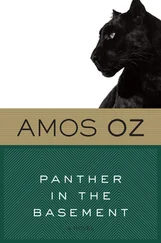Amos Oz - Where the Jackals Howl
Здесь есть возможность читать онлайн «Amos Oz - Where the Jackals Howl» весь текст электронной книги совершенно бесплатно (целиком полную версию без сокращений). В некоторых случаях можно слушать аудио, скачать через торрент в формате fb2 и присутствует краткое содержание. Год выпуска: 2012, Издательство: Houghton Mifflin Harcourt, Жанр: Современная проза, на английском языке. Описание произведения, (предисловие) а так же отзывы посетителей доступны на портале библиотеки ЛибКат.
- Название:Where the Jackals Howl
- Автор:
- Издательство:Houghton Mifflin Harcourt
- Жанр:
- Год:2012
- ISBN:нет данных
- Рейтинг книги:4 / 5. Голосов: 1
-
Избранное:Добавить в избранное
- Отзывы:
-
Ваша оценка:
- 80
- 1
- 2
- 3
- 4
- 5
Where the Jackals Howl: краткое содержание, описание и аннотация
Предлагаем к чтению аннотацию, описание, краткое содержание или предисловие (зависит от того, что написал сам автор книги «Where the Jackals Howl»). Если вы не нашли необходимую информацию о книге — напишите в комментариях, мы постараемся отыскать её.
Where the Jackals Howl — читать онлайн бесплатно полную книгу (весь текст) целиком
Ниже представлен текст книги, разбитый по страницам. Система сохранения места последней прочитанной страницы, позволяет с удобством читать онлайн бесплатно книгу «Where the Jackals Howl», без необходимости каждый раз заново искать на чём Вы остановились. Поставьте закладку, и сможете в любой момент перейти на страницу, на которой закончили чтение.
Интервал:
Закладка:
But soon the darkness betrayed those who had made it their refuge, fading gradually from the peaks of the eastern hills, the lands of the enemy.
1962
Strange Fire
Night spread his wings over the peoples of the world. Nature spun her yarn and breathed with every turn of the wheel. Creation has ears, but in her the sense of hearing and that which she hears are one thing, not two. The beasts of the forest stir and search for prey and the beasts of the farm stand at the manger. Man returns home from his labor. But as soon as man leaves his work, love and sin are digging his grave. God swore to create a world and to fill the world. And flesh shall draw near to flesh. .
— Berdichevski, Hiding in the Thunder1
AT FIRST THE two old men walked without exchanging words.
On leaving the brightly lit and overheated clubroom they helped each other on with their overcoats. Yosef Yarden maintained a dogged silence, while Dr. Kleinberger let out a long series of throaty coughs and finally sneezed. The speaker’s words had left them both in a state of depression: All this leads nowhere. Nothing ever comes out of these discussions. Nothing practical.
An air of weariness and futility hung over the sparsely attended meetings of the moderate Center Party, of which the two friends had both been members for many years. Nothing will ever come of these meetings. Precipitate action is dragging the whole of the nation into an orgy of arrogant affluence. The voice of reason, the voice of moderation, the voice of common sense, is not heard and cannot be heard in the midst of this jubilation. What are they to do, the few men of sense, no longer young, the advocates of moderate and sober statesmanship, who have seen before in their lifetime the fruits of political euphoria in all its various forms? A handful of men of education and good sense cannot hope to put a stop to the intoxication of the masses and their jubilant, lightheaded leaders, all of them skipping with yells of triumph toward the abyss.
After some thirty paces, at the point where the side street opened into one of the majestic and tranquil boulevards of the suburb of Rehavia, Yosef Yarden stopped, thus causing Dr. Kleinberger to stop as well without knowing why. Yosef Yarden fumbled for a cigarette and, after some difficulty, found one. Dr. Kleinberger hastened to offer his friend a light. Still they had not exchanged a single word. With delicate fingers they shielded the little flame from the wind. Autumn winds in Jerusalem blow strongly, ferociously. Yosef thanked his companion with a nod of his head and inhaled smoke. But three paces farther on, the cigarette went out, for it had not been properly lit. Angrily he threw it down on the sidewalk and crushed it with the heel of his shoe. Then he thought better of it, picked up the crumpled cigarette, and tossed it into a trash can that the municipality of Jerusalem had placed on the iron pole of a bus stop.
“Degeneracy,” he said.
“Well, really, I ask you,” replied Dr. Kleinberger, “is that not a simplistic, almost vulgar definition for a reality that is by definition complex?”
“Degeneracy and arrogance, too,” insisted Yosef Yarden.
“You know as well as anyone, my dear Yosef, that a simplistic definition is a form of surrender.”
“I’m sick of this,” said Yosef Yarden, adjusting his scarf and the collar of his coat against the freezing daggers of the wind. “I’m sick of all this. From now on I shall not mince words. Disease is disease, and degeneracy is degeneracy.”
Dr. Kleinberger passed his tongue over lips that were always cracked in winter; his eyes closed like the embrasures of a tank as he commented:
“Degeneracy is a complex phenomenon, Yosef. Without degeneracy there is no meaning to the word ‘purity.’ There is a cycle at work here, some kind of eternal wheel, and this was well understood by our Sages when they spoke of the evil side of human nature, and also, on the other hand, by the Fathers of the Christian Church: apparently degeneracy and purity are absolute opposites, whereas in fact one draws the other out, one makes the other possible and makes it flourish, and this is what we must hope for and trust in in this decadent age.”
An arrogant wind, sharp and chilly, blew in the streets of Rehavia. The street lamps gave out an intermittent yellowish light. Some of them had been smashed by vandals and hung blind on top of their posts. Birds of the night had nested in these ruined lamps.
The founders of the Rehavia quarter planted trees and laid out gardens and avenues, for it was their intention to create amid the sun-bleached rocks of Jerusalem a pleasant and shady suburb where the piano might be heard all day and the violin or the cello at nightfall. The whole neighborhood basks beneath a cluster of treetops. All day the little houses stand sleepily on the bed of a lake of shadow. But at night dim creatures roost in the foliage and flap their wings in the darkness, uttering despairing cries. They are not so easy to hit as the street lamps; the stones miss their mark and are lost in the gloom, and the treetops whisper in secret derision.
And surely even these opposites are not simple but complex; in fact, one draws the other out and one cannot exist without the other, et cetera, et cetera. Dr. Elhanan Kleinberger, a bachelor, is an Egyptologist with a modest reputation, particularly in the European state from which he escaped by the skin of his teeth some thirty years ago. Both his life and his views bear the mark of a brilliant stoicism. Yosef Yarden, an expert in the deciphering of ancient Hebrew manuscripts, is a widower who is shortly to marry off his eldest son, Yair, to a girl named Dinah Dannenberg, the daughter of an old friend. As for the birds of the night, they roost in the heart of the suburb, but the first fingers of light drive them away every morning to their hiding places in the rocks and woods outside the city.
The two elderly men continued their stroll without finding anything further to add to the harsh words they had heard and spoken before. They passed by the Prime Minister’s office on the corner of Ibn Gabirol Street and Keren Kayemet Street, passed the buildings of the secondary school, and paused at the corner of Ussishkin Street. This crossroads is open to the west and exposed to the blasts of cold wind blowing in from the stony fields. Here Yosef Yarden took out another cigarette, and again Dr. Kleinberger gave him a light and shielded it with both his hands like a sailor: this time it would not go out.
“Well, next month we shall all be dancing at the wedding,” said the doctor playfully.
“I’m on my way now to see Lily Dannenberg. We have to sit down and draw up a list of guests,” said Yosef Yarden. “It will be a short list. His mother, may she rest in peace, always wanted our son to be married quietly, without a great show, and so it will be. Just a modest family ceremony. You will be there, of course, but, then, to us you are like a member of the family. There’s no question about that.”
Dr. Kleinberger took off his glasses, breathed on them, wiped them with a handkerchief, and slowly replaced them.
“Yes. Of course. But the Dannenberg woman will not agree to that. Better not deceive yourself. She’s certain to want her daughter’s wedding to be a spectacular event, and the whole of Jerusalem will be invited to bow down and wonder. You will have to give in and do as she wishes.”
“It isn’t that easy to make me change my mind,” replied Yosef Yarden. “Especially in a case where the wishes of my late wife are involved. Mrs. Dannenberg is a sensitive lady, and she is certainly aware of personal considerations.”
As Yosef Yarden said that it would not be easy to make him change his mind, he began inadvertently to squeeze the cigarette between his fingers. Bent and crushed, the cigarette still did not go out but continued to flicker. Dr. Kleinberger concluded:
Читать дальшеИнтервал:
Закладка:
Похожие книги на «Where the Jackals Howl»
Представляем Вашему вниманию похожие книги на «Where the Jackals Howl» списком для выбора. Мы отобрали схожую по названию и смыслу литературу в надежде предоставить читателям больше вариантов отыскать новые, интересные, ещё непрочитанные произведения.
Обсуждение, отзывы о книге «Where the Jackals Howl» и просто собственные мнения читателей. Оставьте ваши комментарии, напишите, что Вы думаете о произведении, его смысле или главных героях. Укажите что конкретно понравилось, а что нет, и почему Вы так считаете.












